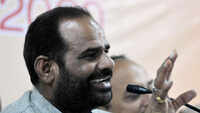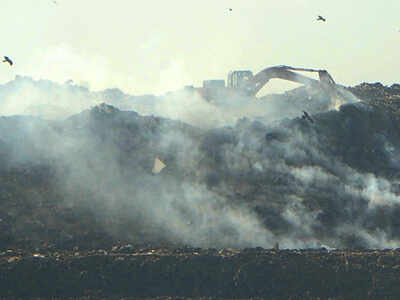
New Delhi: Pollution, sanitation, environmental degradation and decongestion are key issues that Delhi’s residents want their elected representative to address. Changes can be ushered in only if the representatives raise the issue in Parliament and on the right platforms, say resident associations.
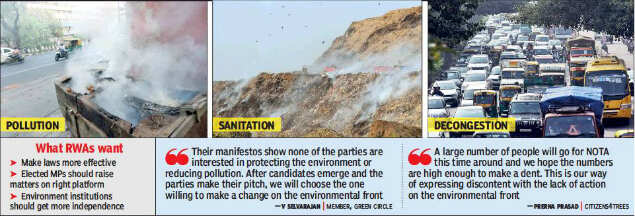
TOI talked to RWAs across the city and realised how serious they were about the new MPs being people able to tackle the city’s problems.
Pollution darkens poll prospects
The RWAs are quite critical of anti-pollution action kicking in only when things get out of control. “Under the Graded Response Action Plan, measures are prescribed even for times when the air quality is ‘moderate’ or ‘poor’,” pointed out Ashutosh Dikshit, chief executive officer, United Residents Joint Action. “But the norms are barely adhered to. So by the time a crisis develops, the authorities are incapable of dealing with it.”
Dikshit charged the MPs and MLAs of remaining unconcerned about these and said, “There isn’t sufficient record of the issues being raised in Parliament or the assembly by our elected representatives.”
B S Vohra, head of the East Delhi RWA Joint Front, added, “We have closely looked at the manifestos of the parties and since they are disappointing on the pollution and environment fronts, we will look at the candidate who can best provide us solutions to these problems.”
Environmental groups intend to get people to vote for the party keen to resolve these issues. “We will choose the candidate who is willing to work for the environment,” affirmed V Selvarajan, member of Dwarka’s Green Circle. Other groups said NOTA was a viable option to express displeasure at the government and political parties. “We hope the NOTA numbers are high enough to make the political parties sit up and notice that people want change,” said Prerna Prasad of Citizens4Trees.
A ‘waste’ of vote
In 2016, the three municipalities took up the task or making select colonies garbage free after the Centre notified the Solid Waste Management Rules. Two years hence, not a single residential area has met even the target of segregating garbage at source. This has not enamoured voters at all. “Conventional methods are still used for collection and disposing of garbage,” noted Pankaj Agarwal, general secretary, Delhi RWAs Joint Front. “In the name of Swachh Survekshan, crore of rupees were wasted on garbage bins and equipment and awareness programmes, but nothing has improved.”
Chetan Sharma, secretary general of the Confederation of NCR RWAs, also expressed disappointed and said, “There is scope for a major overhaul of the sanitation system, but that is possible only if the elected representatives take an interest and set the civic agencies deadlines for achieving targets.”
To minimise the garbage reaching the landfills, the Solid Waste Management Rules focused on recycling. “But nothing is happening. The people living near the landfills and waste-to-energy plants are bearing the brunt of poor planning and the apathy of civic authorities,” grumbled Satish Ghai, general secretary, Sukhdev Vihar Block A RWA.
Sudha Sinha, general secretary, Federation of CGHS Dwarka, asserted that residents would opt after hearing out the candidates. “Each of them must tell us what they will do about pollution and sanitation,” Sinha said.
Congested road to poll booth
Crowded roads are a daily harassment for people. The lackadaisical attempt to tackle encroachment and illegal parking, both of which hamper smooth movement in markets and on roads, has left the people chafing. The RWAs said that nothing is being done in a realistic manner to free public spaces. “We would expect the elected candidates to come up with concrete plans to remove encroachments from the roads and markets,” said Sharma.
He cited his neighbourhood as an example. “The residents of Alaknanda and Greater Kailash II requested DMRC to increase the frequency of feeder buses so people can reach the Delhi Metro stations in the area. We also requested the area councillor to intervene, but there is no relief till date,” Sharma said. Greater Kailash MLA Saurabh Bhardwaj, for his part, blamed the private contractors who run the feeder buses under a public-private partnership for the inadequacy.
No bang for the buck
The Rs 5 crore that each of the city’s seven MPs gets for development under the MP Local Area Development scheme has been used visibly in the past two years to open almost 1,700 open gyms in Delhi parks. But the people not quite jumping with joy. As Pankaj Agarwal of Safdarjung Enclave pointed out, when the majority of municipal roads are in pathetic condition, “the MP funds could have been used for such projects rather than be diverted for other purposes without consulting residents”.
Highlighting such ‘wastage’ of funds, Raj Kumar Tarani, general secretary, C-2 Block RWA, Janakpuri, said every year funds from MPs and MLAs are used on re-tiling pavements “unnecessarily”. “These funds should be spent only on the recommendations of the RWAs,” she declared. “We are going to raise the matter with the candidates.”
Making sense of 2019 #ElectionswithtimesView Full Coverage

With polling for the seven Lok Sabha seats scheduled for May 12 in the city, some RWAs appeared to think that opting for NOTA would best express the displeasure at the poor performance of the current MPs. Others are preparing charters of demands and a few had other ideas.
TOI talked to RWAs across the city and realised how serious they were about the new MPs being people able to tackle the city’s problems.
Pollution darkens poll prospects
The RWAs are quite critical of anti-pollution action kicking in only when things get out of control. “Under the Graded Response Action Plan, measures are prescribed even for times when the air quality is ‘moderate’ or ‘poor’,” pointed out Ashutosh Dikshit, chief executive officer, United Residents Joint Action. “But the norms are barely adhered to. So by the time a crisis develops, the authorities are incapable of dealing with it.”
Dikshit charged the MPs and MLAs of remaining unconcerned about these and said, “There isn’t sufficient record of the issues being raised in Parliament or the assembly by our elected representatives.”
B S Vohra, head of the East Delhi RWA Joint Front, added, “We have closely looked at the manifestos of the parties and since they are disappointing on the pollution and environment fronts, we will look at the candidate who can best provide us solutions to these problems.”
Environmental groups intend to get people to vote for the party keen to resolve these issues. “We will choose the candidate who is willing to work for the environment,” affirmed V Selvarajan, member of Dwarka’s Green Circle. Other groups said NOTA was a viable option to express displeasure at the government and political parties. “We hope the NOTA numbers are high enough to make the political parties sit up and notice that people want change,” said Prerna Prasad of Citizens4Trees.
A ‘waste’ of vote
In 2016, the three municipalities took up the task or making select colonies garbage free after the Centre notified the Solid Waste Management Rules. Two years hence, not a single residential area has met even the target of segregating garbage at source. This has not enamoured voters at all. “Conventional methods are still used for collection and disposing of garbage,” noted Pankaj Agarwal, general secretary, Delhi RWAs Joint Front. “In the name of Swachh Survekshan, crore of rupees were wasted on garbage bins and equipment and awareness programmes, but nothing has improved.”
Chetan Sharma, secretary general of the Confederation of NCR RWAs, also expressed disappointed and said, “There is scope for a major overhaul of the sanitation system, but that is possible only if the elected representatives take an interest and set the civic agencies deadlines for achieving targets.”
To minimise the garbage reaching the landfills, the Solid Waste Management Rules focused on recycling. “But nothing is happening. The people living near the landfills and waste-to-energy plants are bearing the brunt of poor planning and the apathy of civic authorities,” grumbled Satish Ghai, general secretary, Sukhdev Vihar Block A RWA.
Sudha Sinha, general secretary, Federation of CGHS Dwarka, asserted that residents would opt after hearing out the candidates. “Each of them must tell us what they will do about pollution and sanitation,” Sinha said.
Congested road to poll booth
Crowded roads are a daily harassment for people. The lackadaisical attempt to tackle encroachment and illegal parking, both of which hamper smooth movement in markets and on roads, has left the people chafing. The RWAs said that nothing is being done in a realistic manner to free public spaces. “We would expect the elected candidates to come up with concrete plans to remove encroachments from the roads and markets,” said Sharma.
He cited his neighbourhood as an example. “The residents of Alaknanda and Greater Kailash II requested DMRC to increase the frequency of feeder buses so people can reach the Delhi Metro stations in the area. We also requested the area councillor to intervene, but there is no relief till date,” Sharma said. Greater Kailash MLA Saurabh Bhardwaj, for his part, blamed the private contractors who run the feeder buses under a public-private partnership for the inadequacy.
No bang for the buck
The Rs 5 crore that each of the city’s seven MPs gets for development under the MP Local Area Development scheme has been used visibly in the past two years to open almost 1,700 open gyms in Delhi parks. But the people not quite jumping with joy. As Pankaj Agarwal of Safdarjung Enclave pointed out, when the majority of municipal roads are in pathetic condition, “the MP funds could have been used for such projects rather than be diverted for other purposes without consulting residents”.
Highlighting such ‘wastage’ of funds, Raj Kumar Tarani, general secretary, C-2 Block RWA, Janakpuri, said every year funds from MPs and MLAs are used on re-tiling pavements “unnecessarily”. “These funds should be spent only on the recommendations of the RWAs,” she declared. “We are going to raise the matter with the candidates.”
Making sense of 2019 #ElectionswithtimesView Full Coverage
more from times of india cities
Elections 2019
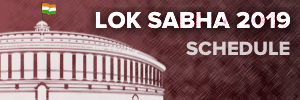
Trending Topics
LATEST VIDEOS
City
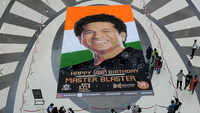 Navi Mumbai: Unique artwork on master blaster Sachin Tendulkar’s 46th birthday at Seawoods Grand Central Mall
Navi Mumbai: Unique artwork on master blaster Sachin Tendulkar’s 46th birthday at Seawoods Grand Central Mall  Delhi: Gautam Gambhir addresses party workers during introductory meet
Delhi: Gautam Gambhir addresses party workers during introductory meet  Lok Sabha elections 2019: BJP fields singer Hans Raj Hans from North-West Delhi
Lok Sabha elections 2019: BJP fields singer Hans Raj Hans from North-West Delhi  Government teachers in Delhi fail to utilise tablets for official work
Government teachers in Delhi fail to utilise tablets for official work
More from TOI
Navbharat Times
Featured Today in Travel
Quick Links
Lok Sabha Election Schedule 2019Lok Sabha Election NewsDelhi Capitals teamMI team 2019Rajasthan Royals 2019RCB team 2019Maharashtra Lok Sabha ConstituenciesBJP Candidate ListBJP List 2019 TamilnaduShiv Sena List 2019AP BJP List 2019Mamata BanerjeeBJP List 2019 MaharashtraPriyanka GandhiBJP List 2019 KarnatakaAMMK Candidate List 2019BJP List 2019 WBLok Sabha Elections in Tamil NaduBSP List 2019 UPNews in TamilLok Sabha Poll 2019Satta Matka 2018PM ModiMahagathbandhanNagpur BJP Candidate ListChandrababu NaiduTamil Nadu ElectionsUrmila MatondkarNews in TeluguMadras High CourtTejashwi YadavArvind KejriwalTejasvi SuryaPawan KalyanArvind KejriwalYogi AdityanathJaya PradaSatta King 2019Srinagar encounter
Get the app
